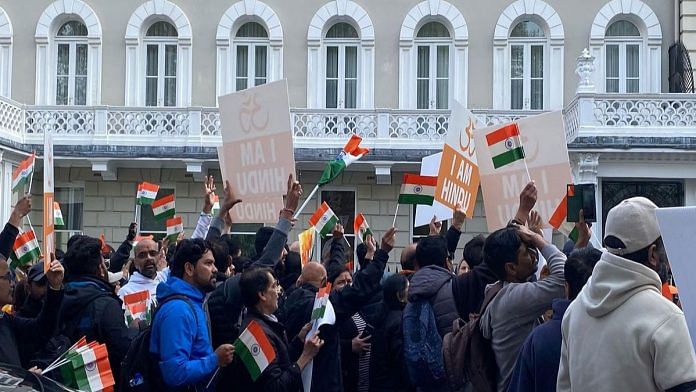The Indian diaspora in London called for a protest in front of the Pakistan High Commission after the Pahalgam terror attack. I was there in solidarity too. Maybe it was anger, or grief trying to find a voice. A way to say that even living far from home, you still carry the same hurt, still feel tied by something deeper than distance. Sitting with everything I was feeling, I decided to show up, not just scroll past. Not out of politics or anger, but out of a simple need to stand with Hindu and Christian victims of Islamic terrorism, and their families who were carrying a quiet sorrow.
When I reached outside the Pakistan High Commission, the reaction from officials was something I hadn’t expected. It wasn’t just cold—it felt like they were ready to mock the pain we had come to share. No remorse. No empathy. No trace of humanity.
I could understand if ordinary citizens acted out like that—driven by anger, nationalism, or whatever else. But officials are usually trained to stay neutral and hold a certain dignity even when disagreeing. Instead, they set up loudspeakers to drown out the voices of protesters. As if the very idea of our grief needed to be silenced.
No shame, no restraint
What happened next really stood out. A staff member appeared on the veranda of the High Commission and made a throat-slitting gesture toward the protesters. It was direct, intentional, and impossible to misinterpret. No official statement was needed after that—actions always speak louder than words. There was no shame, no restraint, and no acknowledgement of the horror we were protesting against. Just more hate offered back to our pain, revealing the sheer depth of their hostility.
At some point during the protest, for some odd reason, the Pakistan High Commission began to blare what sounded like Islamic religious music. This was a demonstration against a terror attack, which, as is being widely alleged, Pakistan had a role to play in. What exactly, then, was being countered with devotional music?
This unfolded against the backdrop of a recent statement by Pakistan Army Chief General Asim Munir, where he emphasised the differences between Hindus and Muslims while invoking the two-nation theory. When a country’s army chief makes such comments, terrorists kill Hindus based on their identity, and religious songs are blasted onto a crowd mourning violence, it becomes easy to connect the dots. It could all be a big coincidence, but it sure didn’t feel that way. Not in that moment.
Also read:
Bound by grief, not faith
Indian protesters hit back by chanting religious slogans. I usually do not condone religious invocations during protests. But in this case, it made sense. The victims were targeted because they were Hindu. So, people expressing their Hindu identity through religious slogans didn’t feel out of place.
What stood out to me more were all those who showed up for India. People from different religions and even nationalities—Sikhs, Muslims, Jews, and, I heard, some Iranians too. Looking at it felt like a giant contrast. On one side, a blatant display of religious supremacy. On the other, people standing together—united not by religion, but by a shared grief. That, to me, said more than any speech could have.
Of course, the protest wasn’t entirely dignified. As both sides taunted and mocked each other, an Indian protester smashed the High Commission’s window. A few slogans—such as those directed at Prime Minister Narendra Modi—strayed from the point. Sometimes, protesters forget why they’re demonstrating in the first place. Anger takes over, and people begin to express outrage instead of holding space. And when that happens, something gets lost—especially when the protest is meant to honour the dead.
Amana Begam Ansari is a columnist, writer, TV news panelist. She runs a weekly YouTube show called ‘India This Week by Amana and Khalid’. She tweets @Amana_Ansari. Views are personal.
(Edited by Zoya Bhatti)







If i were the prime minister of India, i would have asked the RAW to slit his throat on the same day of his threatening gesture.